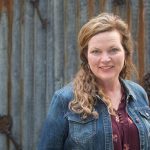A conversation with author Marie Bostwick
by Rhonda Morin
This interview was edited for clarity and length. For the full interview, listen to the podcast.
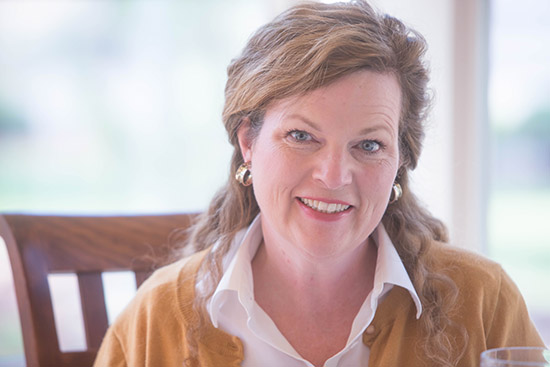
Author and Clark alumna Marie Bostwick. Photo by Deanna Leach
Partners: Marie Bostwick, welcome to Penguin Chats.
Marie Bostwick: Thank you. Glad to be here.
Partners: You’ve always loved the written word; I’ve read in your background that you dabbled in writing love stories as a young girl.
Bostwick: I invented chick lit at the age of 13. Chick lit as in chick literature. Chick lit is kind of like “Sex and the City” type of genre. It’s usually young urban professional women. There was no actual sex in the “Sex and the City” books that I wrote when I was 13 with my friend, Julie, in her parents’ basement, but there were a lot of shopping trips in these books. Chick lit actually didn’t come about until about 30 years later, but the truth is, Julie and I invented it.
Partners: You should have copyrighted it. Once you were married to your husband, Brad, things changed for you. The two of you had children, you were with him while he was advancing his career, so a lot was happening in your life. But that changed for you in the mid-90s when you went to some type of writing workshop. Tell us about how you went from busy mom and supporting your husband, to coming back to something that you loved as a young girl.
Bostwick: I never stopped being a busy mom. So much of my career was developed when I had children at home. And I, like a lot of writers and especially female writers, had to work around child rearing with my career.
We had just moved to Mexico, and I was going through kind of a culture shock. I had also had a baby about 15 months before. I was dealing with postpartum depression and culture shock at the same time. It was a rough year. Some girlfriends of mine called and wanted me to go to this spa. It was arranged that this would probably be a good thing for me to shake me out of this, this depression that I was in.
I went to this place. There was a lot of exercising, which is not something I spend many hours a day doing normally. But it was nice, and they had this writer’s workshop. This was a place where you went for a whole week. It was like summer camp. Everybody arrives on Sunday morning and leaves on Saturday morning kind of a thing. The writer’s workshop met for two hours every day and I thought, well, I could do that and then I wouldn’t have to play tennis or sweat.
There were a lot of people in there. Somehow I didn’t think there would be and I almost left, because I thought, well, what if they want you to read stuff out loud? That would be awful. Most writers have voices in their heads. I’ve always had voices in my head and in my world. One of the prominent ones is my mother. My mother’s voice came into my head and she said, ‘what do you care, we will never see these people again.’ I decided to stay. I thought, I’ll do one day and if I don’t like it, I won’t stay.
I hadn’t really studied writing in an organized fashion. I didn’t really understand even the terminology. I didn’t have a good understanding of first-person versus third-person. I did it, but I didn’t know the vocabulary.
Budding fiction writer
Partners: This workshop—did it help you learn those things?
Bostwick: It gave me writing prompts and chances to write. On about the third day, my hand went up and I felt brave enough to read. The room got really quiet, and I had everybody’s attention. When you’re a mother of three in your 30s, you never have anybody’s attention.
This was a new thing, and it felt pretty good. But it wasn’t like life-changing. At the end of the week, the gentleman who was the facilitator pulled me aside and said, ‘so what have you published?’
Partners: How encouraging.
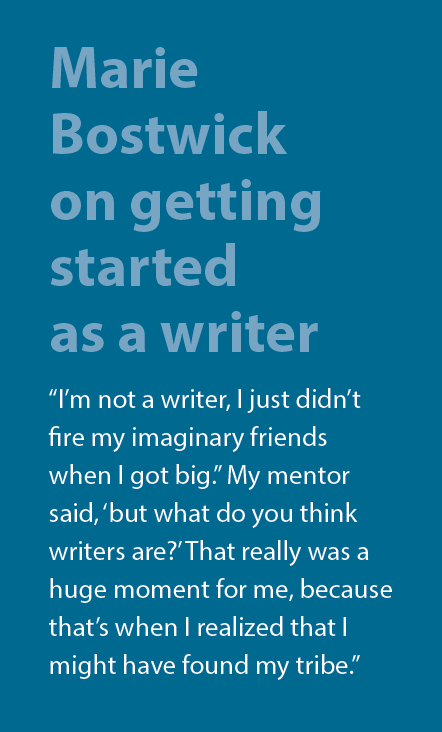 Bostwick: It was very encouraging, although it was also kind of alarming, because he was like, well, you have to go to graduate school. I said, yeah, I live in the Third World and I’m breastfeeding. That’s not going to really happen, but thanks. He was like, ‘you’re a writer. You have to. You must.’ I just argued with him. Then I said, “I’m not a writer, I just didn’t fire my imaginary friends when I got big.” He said, ‘but what do you think writers are?’ That really was a huge moment for me, because that’s when I realized that I might have found my tribe.
Bostwick: It was very encouraging, although it was also kind of alarming, because he was like, well, you have to go to graduate school. I said, yeah, I live in the Third World and I’m breastfeeding. That’s not going to really happen, but thanks. He was like, ‘you’re a writer. You have to. You must.’ I just argued with him. Then I said, “I’m not a writer, I just didn’t fire my imaginary friends when I got big.” He said, ‘but what do you think writers are?’ That really was a huge moment for me, because that’s when I realized that I might have found my tribe.
This thing that I did and always had done—there were other people like me. It was a really good moment to not feel “other.” To feel like I belong to a group. The gentleman was the director of the graduate writing program at Colorado State University. When it became clear that there was no way I could go back to graduate school at that point, he became my mentor. I studied with him basically through the mail, because the internet had not yet been discovered. I wrote a short story for him every month for three years.
Partners: He gave you a regular assignment?
Bostwick: My assignments were pretty basic. He said, ‘I want you to write me a short story. It needs to be on my desk by the 10th. If it arrives on the 11th, I won’t read it.’ That’s what we do—there were deadlines from day one. He would just give me his comments, and I would write something else the next month. After about three years of this, one of my short stories kept getting longer and longer and longer. I didn’t have an outline, so I didn’t know how it ended, but about 70 pages into this thing, I thought it might be a book. In fact, it did turn out to be the first book I ever had published, “Fields of Gold.”
Relentless deadlines
Partners: That book was published in 2005. Since then—and maybe this started with that mentor—you have been extremely productive. You have published one to two novels a year. Please tell us how you write that fast.
Bostwick: I have been on deadline since 2004 when my first book was published. Quite frankly, it is a lot of pressure, but I will say it’s not at all that remarkable for a writer in commercial fiction, which is what I do, to produce one to two books a year. In fact, compared to many of my friends, I’m a complete slacker. I have friends who write three or four books a year.
Some of that is just the pressures of the business. I am an artist, and this is my art form, but it is also a business. To be able to make a living doing what I do and for my publisher to make a living doing what they do, they have to have a supply of books that people want to read. That’s what I do. I finish a book. I take maybe a week off where I don’t do anything, and then I start the next one.
Partners: Are you ever fearful that those voices will go away?
Bostwick: Constantly, constantly! I think fear is part of being a novelist. If you’re not afraid, you’re not really going to do good work. The pressure is part of it. My agent is wonderful. She is very involved in my process in a way that’s quite unusual. She is my first-round reader. She is the one I bounce ideas off. She and I have good gossipy sessions about things like what my characters are doing, because I’m feeling a little stuck in the book I’m working on now. She gives such good advice.
It’s easy to start a book. It’s very difficult to finish it. Most books, get tricky in the middle. I think that’s the case for most writers. I always know how the book starts, and I know how it ends. Now, how do I get from A to Z?
Murder your darlings
Partners: Scenes are important in the narrative of storytelling. Sometimes this is hard for new writers, like Clark College students, to compose fully developed or fleshed out scenes. Can you talk about scene writing and what you need in order to write a scene rather than just summarize it?
Bostwick: Before you write a scene, you need to have an outline. I think of a book the same way I think of a piece of classical music. Classical music has the legato sections, the allegro sections and there are different emotions. There should be rise and fall and movements of action that occur throughout the whole piece. You can’t think just about that scene, you’ve got to think about the book as a whole and how this scene fits into it.
When you’re approaching a scene, the first thing you want to think about is that every scene in itself is kind of like a little mini-book. When you’re looking at a book, one of the big questions is what does the main character want? What is preventing him or her from getting what he or she wants? Well, that occurs in almost every scene. What is the problem in this scene? What does my character want? What’s getting in the way of them getting that thing?
If you ask yourself those questions, chances are the conversation is going to appear pretty naturally into what that person is trying to get past, or who’s standing in the way or what is standing in the way. Begin this way, then craft the situation, the place, the time and the other characters. Remember too, if you’ve got a main character, who are the other characters in the room, and why are they there?
Everything that’s in the scene has to be there. There should be no stuff in the scene just for fun. Anybody who has been writing for very long knows the phrase ‘murdering your darlings.’ There are times when you write something and it’s just for you. You love the way those words sound, and you’re congratulating yourself on that very fine sentence. That’s usually a sign that you should delete it, because it is just about you. However, I think it all gets down to that one thing; in this scene, what’s the problem and what’s standing in the way of that character? Are they going to solve the problem now or later?
Partners: When do you know a scene has the right amount of detail versus the copy you should throw out?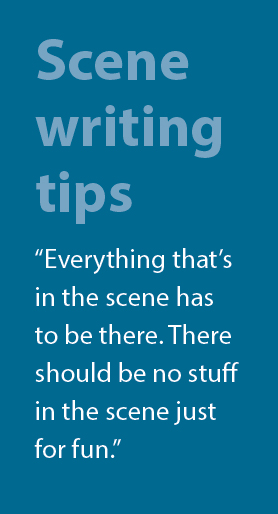
Bostwick: I write everything and then delete. When I’m editing, it can be anywhere from three to eight complete—and I mean complete—rewrites of a book. It depends on how well it’s going, and a lot of it depends on how much time I’ve spent thinking about it up front. Sometimes I have to go through it more times. Those rewrites are very important. If you don’t like to rewrite or if you can’t at least make peace with it, you should probably consider another line of work. There is a saying: good books are written. Great books are rewritten.
Most of the time when I am doing those rewrites, I am subtracting, not adding. You really do have to go through very critically and say, ‘does that sentence, that paragraph, that page; does it need to be there? Does it advance the story? Does it advance either my knowledge of the character or the situation or the other characters and problems in the book?’
If it doesn’t, then sometimes, especially in commercial fiction, our objective can be just to amuse. However if we’re amusing, it’s because we want to know that the character is a fun person or somebody you would want to spend time with. There can be a purpose of bonding a reader to a character. But there’s got to be a purpose. It’s not just about you.
Partners: You’re saying seven or eight rewrites. That sounds like a whole lot of discipline. What is your process like? Do to write from 8 a.m. to 2 p.m., nonstop every day?
I’m not lazy
Bostwick: [LAUGHTER] Part of being a writer is learning to deal with the fact that you’re going to spend a lot of time feeling guilty. Yes, there is a discipline, but the truth is, writers are natural procrastinators. After having done this for such a long time, I have recognized that to some degree my procrastination isn’t procrastination, but in fact part of my creative process.
Some days, I want to count words or pages that I get done, but sometimes I just need to think. Sometimes I spend a lot of time going on a walk with the characters trying to figure out what the problem is. I spend a lot of time beating myself up about things like, I didn’t do this, and I didn’t do that and I’m lazy. But I’m not lazy. I’m the farthest thing from lazy. What I’m not is a fast writer.
Most of my writer friends who are fast, learned to write in a newsroom, and I didn’t have that advantage. If I write 2,000 words in a whole day—and by a day, I mean a 10-hour day—that’s a good day for me. I’m not fast. I have to put in more hours than other people.
A 60-hour work week is normal for me. Sixty hours doesn’t mean 60 hours of writing, unless I’m on deadline, then it can mean 14 and 16 hours of writing.
There’s also a lot of my world that is business, too. I didn’t really realize when I became a writer that I was also becoming a small business owner. I am terrible at that part, but it is part of the reality of what I do.
Ordinary people
Partners: Let’s talk about voice or style. Clark faculty tell me that’s something that can feel very elusive and sometimes difficult to teach. How have you cultivated your voice as a writer?
Bostwick: I’m known for a strong female voice. I think for me it comes quite naturally. That is, in fact, my strongest suit. I write many of my books in first-person, because that’s the way I hear the characters and the voices in my head. I understand that they’re not real people, but I know what that character is like and what she would say or think in situations.
Some of that is about cultivating your imagination, something we do quite naturally as children, but then at some point, we stop. We’re all very imaginative, but we are urged to put that aside, and I just didn’t. The tricky part for me is that I love the characters so much and I’m so interested in who they are, I don’t really care if they do anything. Therefore, plot is a lot more difficult for me. I didn’t need my characters to act, but of course, to be a novelist, there has to be a problem.
Partners: How did you learn about creating plots?
Bostwick: I have to process those issues verbally. I need someone to talk to—somebody who asks me good questions when I get stuck. They say plot is character, and that’s true. The better you know your character, those plot things tend to spring up entirely naturally.
My agent—she asks me things; she doesn’t tell me what to write, but she asks me questions. She will say, ‘what did Grace love to do when she was little?’ That question can suddenly get my imagination going: the things she loved to do when she was little were this and this. Is she doing that now? If she is, what does she get from that? If she’s not, why isn’t she? Is there an organic problem that’s getting in her way? Is it a lack of confidence? Is it a lack of opportunity? Has someone told her she shouldn’t or couldn’t?
This opens up plot difficulties, too. I tend to write about people who are, by and large, relatively ordinary types of people. They’re not superheroes. They’re not sports heroes. They’re not famous. They are kind of average people who you might meet, because I think everybody is terribly interesting. Everybody has a fascinating story if you start talking to them. Part of what I’m doing with plot is looking at the challenges I faced in my life or people I know, such as ordinary women who have faced difficult times.
Partners: Where do you find the confidence to tell stories about ordinary people and make it into a story that you feel is worth reading and sharing?
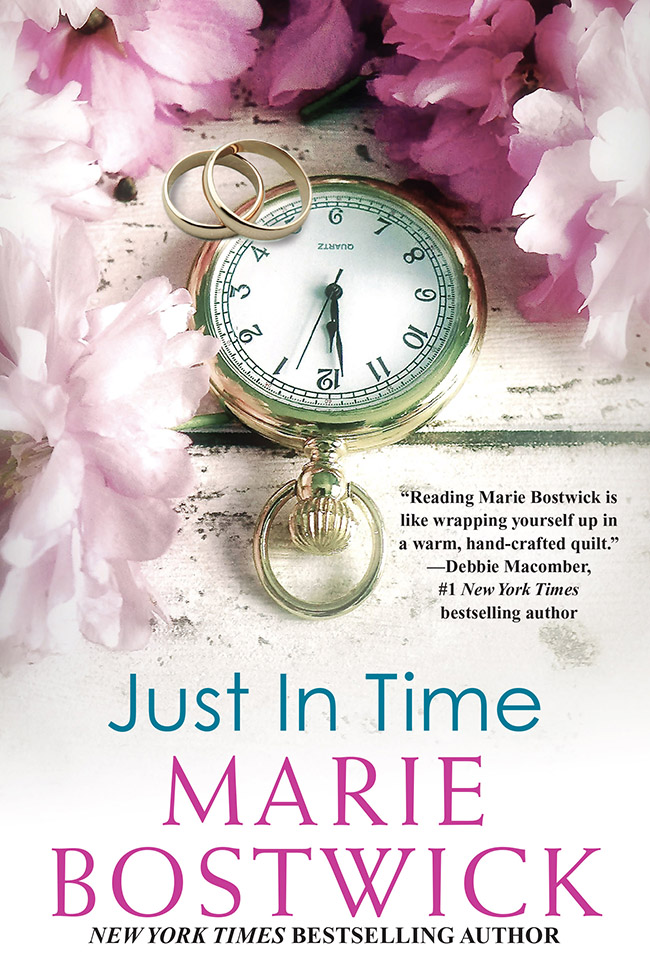 Bostwick: First of all, I’m superbly unconfident a lot of the time. There is a time in every book— it’s pretty much consistently between page 160 and 185—when I decide that this book is complete rubbish, I have no talent and I should hit delete. Then I call my sister and we talk. It takes about three hours for her to convince me not to hit delete and start writing a different book. So I’m never confident; you just power through it.
Bostwick: First of all, I’m superbly unconfident a lot of the time. There is a time in every book— it’s pretty much consistently between page 160 and 185—when I decide that this book is complete rubbish, I have no talent and I should hit delete. Then I call my sister and we talk. It takes about three hours for her to convince me not to hit delete and start writing a different book. So I’m never confident; you just power through it.
As far as having the courage to tell that story, I just think everybody’s awfully interesting. I could go and sit in a room with five different people and if they were willing to answer my questions, I could come up with a plot. If you’re born a writer, this happens to you.
Unabashed happiness
Partners: One of the things that Clark student writers struggle with is how to end stories in a way that provides a resolution. It’s tempting to tie up things in a really neat bow or create dramatic turns at the end of the piece, but sometimes that can feel forced and unrealistic. What kinds of thoughts or advice do you have for writing endings?
Bostwick: If you read my books, there’s going to be a happy ending. It’s a rule with me. My rule is that life is hard and fiction doesn’t have to be. I like to leave my characters in a very good place. I’ve gotten some criticism for that, and I don’t care, because my readers are happy with it and so am I. I know that everything doesn’t always work out in real life, but I like to provide the hope that it could. I think that’s what helps me get up in the morning, the hope that the happy ending is coming.
This being said, you don’t have to answer every single question. I know I’ve really done a great job with a book when I get mail from readers saying, ‘I wish you’d write a sequel because I feel like we could know more about…’
If you give your reader a place where they can imagine where that character is a year from now, then that’s really good.
The other thing is about the big dramatic, climactic thing in the book. The denouement as it is known. Well, that is where I get back to a book as a whole being like a piece of music. There are pieces of classical music that end with the big crash. I don’t particularly enjoy them. For me, the best pieces of music build to that crescendo and then they ebb off a little bit.
If you try to end your book right at the most dramatic moment, readers are going to feel like you pulled the rug out from under them. You need to help your reader ease back into a way of knowing that their characters are doing what they’re supposed to do, and then the reader needs to move back into his or her real life.
She’s a penguin
Partners: You took courses here at Clark College in 1980 and you also graduated from nearby Hudson’s Bay High School. Lately, you’ve been reconnecting with Clark. Your husband Brad Skinner is a member of Clark College Foundation’s Board of Directors. And you’ve also been asked to come to Clark during the Subtext Festival this year. What is like to return home?
Bostwick: I’m happy for the opportunity. I’m here to serve Clark students. I’m coming to serve the community, because I was myself served by good teachers and people who took an interest in me when I was young.
We’re going to have a small lunch—it’s lunch with an author (during Subtext Festival in May). We’ll meet with students from the advanced fiction program and a few other students. It’s going to be small, no more than about 25 people, and we’re going have a very frank conversation. I’m going to briefly talk about my career and what it took to get from a lady with three kids hanging on her ankles and writing at the kitchen table longhand; to having written 14 novels and made a career doing this. But for most of the session I want there to be questions. I want people to be able to ask anything.
There’s a lot of fear that goes along with writing. As I said before, if you’re not afraid, you’re not doing it right. I hope to be able to provide guidance and real honesty about what it takes if it is your heart’s desire to make writing your career.
Partners: Thank you, Marie, for being so candid with us about your process.
Bostwick: You’re welcome. It’s been a pleasure.




